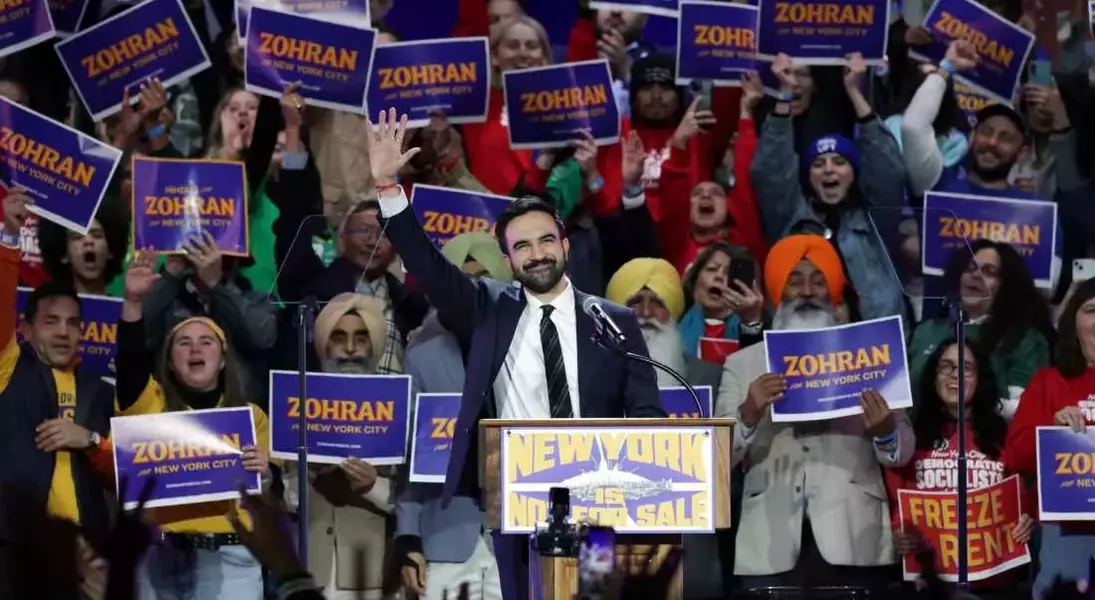



Zohran Mamdani, a New York City mayoral contender, has unexpectedly risen to national prominence, captivating young voters across the United States. His campaign, centered on tackling the escalating cost of living, has struck a chord with a generation disillusioned by conventional politics. This burgeoning support extends far beyond New York's borders, driven by a shared desire for leaders who genuinely address their economic anxieties.
Mamdani's Message Resonates: A National Movement for Affordability
In a surprising turn of events on November 2, 2025, Zohran Mamdani, a 34-year-old Democratic Socialist and New York State assemblyman, transformed from an underdog in the New York City mayoral race into a national political icon. His campaign's core message—addressing critical affordability issues—has struck a deep chord with young people across the nation, propelling him to a significant lead over his closest competitor, former New York Governor Andrew Cuomo. This momentum began months earlier with a stunning victory in the June primary, where voters aged 18-29 demonstrated the highest turnout among all age groups.
Mamdani's platform includes ambitious proposals aimed at easing financial burdens for New Yorkers, such as a rent freeze for stabilized units, the construction of 200,000 new affordable housing units, city-run grocery stores, and free public transportation and childcare. While critics, both on the left and right, have labeled some of his ideas as unrealistic or extreme, these warnings have largely failed to deter a growing number of young Americans. For many, Mamdani's appeal lies not in traditional party affiliations but in his willingness to challenge the established order and articulate their urgent economic concerns.
Lea Ash, a 26-year-old Democrat residing over 1,200 miles away in conservative Gulfport, Mississippi, exemplifies this sentiment. Despite her geographical distance, Ash finds renewed hope in Mamdani's vision, viewing him as a politician who genuinely listens to the people. Her personal struggles with affordability, exacerbated by the pandemic's impact on her college education and subsequent inability to secure independent housing despite employment, underscore the widespread nature of the issues Mamdani addresses. Ash hopes that a Mamdani victory in New York will send a powerful signal to Democratic leaders nationwide, urging them to prioritize housing affordability and other pressing economic challenges.
Similarly, Emily Wilson, a 26-year-old Democrat in St. Petersburg, Florida, actively supports Mamdani from afar. She observes that issues like grocery, bus, and rent prices transcend partisan divides, affecting both Democrats and Republicans. Wilson believes that a candidate with a similar economic message, tailored to local community needs, could achieve comparable success in other states. Daisy Lupa, 25, from a small town near Ann Arbor, Michigan, shares this perspective, finding Mamdani's campaign refreshing compared to the national Democratic establishment. She contends that his proposals, while focused on New York, are even more desperately needed in rural areas and the Midwest, where such solutions are currently nonexistent.
However, despite the widespread enthusiasm, some, like 32-year-old Dillon Robertson, approach Mamdani's ambitious plans with cautious optimism. Facing a quarter-million dollars in student loan debt from his college commute in Connecticut, Robertson is drawn to Mamdani's cost-saving initiatives but questions their feasibility. He wonders if these proposals are truly achievable or merely temporary fixes. Nevertheless, in a political landscape often characterized by stagnation, many young voters, including Robertson, are prepared to embrace a new approach, opting for change over the status quo.
The rise of Zohran Mamdani highlights a significant shift in political engagement, particularly among younger generations. His focus on tangible economic solutions and his willingness to defy political norms resonate deeply with an electorate that feels overlooked and financially strained. This phenomenon suggests a growing appetite for authentic leadership that prioritizes the everyday struggles of citizens, signaling a potential reconfiguration of political priorities in the future. Mamdani's journey demonstrates that a compelling message, centered on core issues, can transcend local boundaries and inspire a national movement for change.
